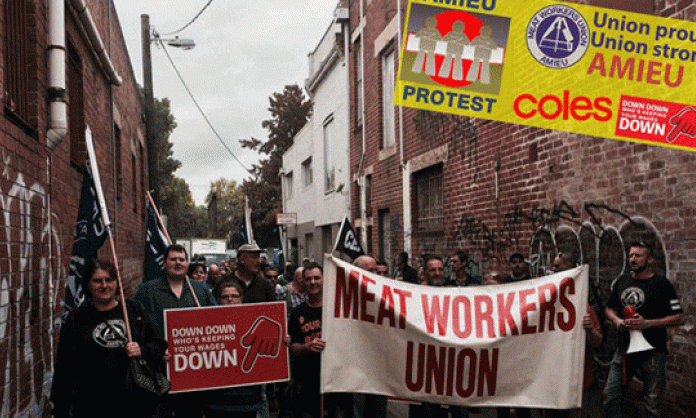After a few minutes talking to the butchers from Coles on the picket line, it’s not hard to understand why they’re on strike.
Rob works a standard shift, five days, every week, 7am to 4pm. Except when it suits management. Say it’s a Wednesday and the specials are changing: he has to start at 6am and finish at 3pm instead. When Coles can make money out of it, changing the shift is easy.
When Rob wants to finish an hour early, on one day, to be at his daughter’s graduation concert, it becomes impossible. His offer to start an hour earlier so that he can leave in time to make her performance means nothing. Changing the shift is impossible.
“Bullied, I feel bullied”, is how Dave describes working for Coles. “Picked on, on a weekly basis.” He relates a story about management sitting the meatworkers down and demanding they draw up a list of ways they can “give more” to the company.
Workers at both Coles and Woolworths describe a trend. They say that meatworkers are being phased out. The supermarkets are moving meat processing off site, to large plants. Less and less butchering takes place in the supermarkets.
The work that does happen on site is increasingly less skilled. Qualified and experienced butchers like Dave demand commensurate wages. Coles now has them training younger workers to cut the meat – “slicers”. With fewer skills, these workers are on lower pay and are easily replaced. By training the “slicers” as directed, Dave knows he’s working himself out of a job. “It’s a tunnel I can’t see the way out of”, he says.
Coles is trying to force a new enterprise agreement on its meatroom workers. Their union, the Meat Industry Employees Union, says wages and conditions will plummet if it gets through. Saturday penalty rates will be abolished and Saturday rates slashed, while for the first time weekend work will become mandated. Rostered days off will be eliminated and the use of junior wage rates expanded.
These workers are in a tough spot. There are only a handful of them in each supermarket. They are scattered across a vast network of stores. There is a sense of precariousness about their jobs. People report colleagues being sacked for minor breaches.
They’re up against an industrial giant in Wesfarmers, the owner of Coles. The pennies it pinches from its workers seem all the more petty in the shadow of its $2.7 billion profit in 2014.
But it’s not just the boss that the meatworkers have to contend with. Their fight is also with one of Australia’s largest and (tragically) most conservative unions, the Shop, Distributive and Allied Employees Association (SDA), which covers the bulk of Coles workers. The SDA has allowed the company to include the butchers in the general retail enterprise agreement it has negotiated with the SDA.
The meatworkers don’t want it, but as a fraction of the Coles workforce, are unlikely to garner enough of the vote to knock it back at the ballot. The butchers down on the picket line know exactly who’s stitched them up. “They [the SDA] seem like a bunch of mugs who are just out to get us”, says Dave.
But the meatworkers are coming out strong. In Victoria, a number of 24-hours stoppages culminated in a mass meeting and protest outside a new Coles store in Richmond on 18 February. More strike action is planned, and workers in other states will soon join the fray. Their union has also launched a “vote no” campaign to put the case to workers in other Coles unions.
Whether they can win is not clear. They have difficulties to face; that much is certain. The only thing more certain is that they have no chance if they don’t give it a go.
----------
For campaign updates and information on solidarity actions in Victoria check vic.amieu.net










